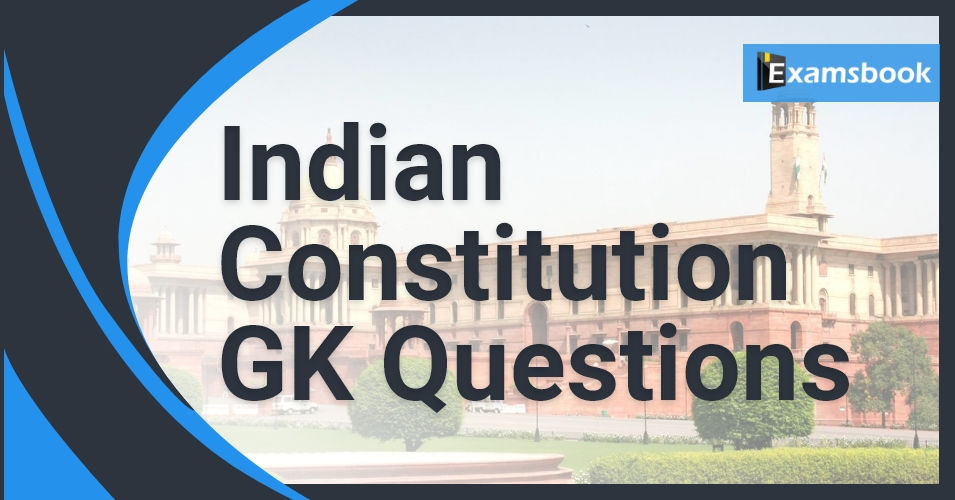Indian Constitution Questions and Answers for Competitive Exams

In the year 1938, who demanded the formation of the Constituent Assembly on the basis of adult suffrage?
(A) Mahatma Gandhi
(B) Jawaharlal Nehru
(C) Rajendra Prasad
(D) Bhimrao Ambedkar
Correct Answer : B
Explanation :
In 1938, Jawaharlal Nehru, on behalf of the INC declared that 'the Constitution of free India must be framed, without outside interference, by a Constituent Assembly elected on the basis of the adult franchise'.
Under the provision of which article of the constitution Bharat Ratna, Padma Vibhushan etc. decorations are provided by the Government of India?
(A) Article 23
(B) Article 20
(C) Article 19
(D) Article 18
Correct Answer : D
Explanation :
Bharat Ratna and Padma Awards are titled under Article 18(1) of 'the Constitution of India. 2. Padma Awards, which were instituted in the year 1954, were suspended only once.
Who has been given the right to hear about fundamental rights?
(A) Supreme Court
(B) High Court
(C) Prime Minister `
(D) Supreme Court and High Court
Correct Answer : D
Explanation :
All people, irrespective of race, religion, caste, or sex, have been given the right to move the Supreme Court and the High Courts to enforce their fundamental rights. Seven categories of Fundamental Rights are covered by Articles 12-35. Part III of the Indian Constitution talks about Fundamental Rights.
In which article of the Constitution it is mentioned that India means 'India will be a Union of States'?
(A) Article - 1
(B) Article 3
(C) Article 2
(D) Article 4
Correct Answer : A
Explanation :
Article 1 says “India, that is Bharat, shall be a Union of States.” This particular article of the Constitution is a crucial statement as it lays down what our nation will be called. The draft of Article 1 was adopted on September 18, 1949, which was moved by the chairman of the Drafting Committee, Dr. Ambedkar.
Which Constitutional Amendment Act, provided reservation in admissions in private unaided educational institutions for students belonging to scheduled castes/tribes and other backward classes?
(A) 93rd Constitutional Amendment Act, 2005
(B) 92nd Constitutional Amendment Act, 2003
(C) 94th Constitutional Amendment Act, 2006
(D) 95th Constitutional Amendment Act, 2009
Correct Answer : A
Explanation :
The 93rd Amendment Act, which was passed in 2005, is the Constitutional Amendment Act that allowed reservation in admissions for students belonging to scheduled castes/tribes and other backward classes in India.
Which article of the Indian constitution says that “Parliament has the power to make laws on any matter in the state list if a proclamation of emergency is in operation?
(A) Article 256
(B) Article 227
(C) Article 275
(D) Article 365
Correct Answer : B
Explanation :
Draft Article 227 (Article 250, Constitution of India, 1950) was debated on 13 June 1949. It permitted the Parliament to make laws on subjects in the State List during an Emergency. There was no substantive debate on this Article. Draft Article 227 was adopted on 13th June 1949.
Whom does the Vice President inform about the resignation of the President to?
(A) Prime Minister
(B) General
(C) Lok Sabha Speaker
(D) None of these
Correct Answer : C
Explanation :
If the President resigns, the Vice-President informs the Speaker of Lok Sabha about the President's resignation. In draft article 45, 1948, it was mentioned the President may hand over his resignation to the Vice-President and the Speaker of Lok Sabha. It was accepted in 1950 without amendment as article 56.
As a result of the reorganization, what was the number of members of the Constituent Assembly in the year 1947?
(A) 450
(B) 572
(C) 299
(D) 272
Correct Answer : C
Explanation :
New elections were held for the West Punjab and East Bengal (which became part of Pakistan, although East Bengal later seceded to become Bangladesh); the membership of the Constituent Assembly was 299 after the reorganization, and it met on 31 December 1947.
The Constitution of India guarantees the right to education to all children in the age group of:
(A) 6-14 years
(B) 6-18 years
(C) 6-10 years
(D) 6-12 years
Correct Answer : A
Explanation :
The concept of the Directive Principle of State Policy in our constitution was taken from which constitution?
(A) USA
(B) Canada
(C) U.S.S.R.
(D) Ireland
Correct Answer : D
Explanation :
Articles 36-51 under Part IV of the Indian Constitution deal with Directive Principles of State Policy (DPSP). They are borrowed from the Constitution of Ireland, which had copied it from the Spanish Constitution.



